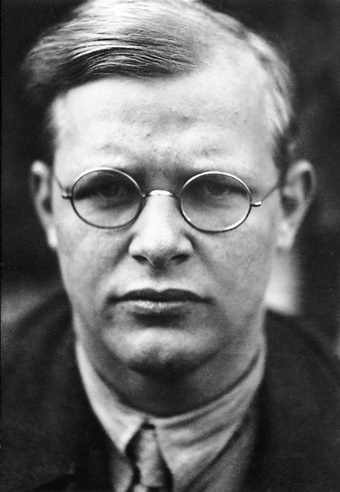CHURCH HISTORY
Church Foundations
Deitrich Bonhoeffer
By Brandon Markette

Born in 1906 to an upper class family, Dietrich Bonhoeffer learned the Christian faith from his mother. His father, an eminent neurologist, taught at Berlin University. With his mother's faith and his father's mind, Bonhoeffer choose to study theology and serve as a pastor. He embarked upon his pastoral work in Spain, as a student pastor for a German congregation in the Spanish town of Barcelona. After this he would spend time studying in the United States, working with international, ecumenical groups, and pastoring a church in London. Perhaps as a result of this international study and work, Bonhoeffer grew committed to ecumenism. This commitment would later prove vital during World War II.
Often times the crucibles of life sharpen our thinking and produce powerful ideas. Such was the case for Bonhoeffer. As Nazism grew in power, it began to co-opt the German Church with its false gospel. Bonhoeffer became one of the most vocal opponents to this syncretism, chastising the church for its involvement with the Nazis and throwing his lot in with the Confessing Church. In 1935, with German seminaries under the influence of a Nazi-friendly theology, the Confessing Church called Bonhoeffer to lead a Preacher's School in Finkenwalde. Though short lived, Bonhoeffer's work with these students still influences Christians today.
By 1938 the Confessing Church seminaries, like Finkenwalde, were closed by the Nazis. As former students were drafted into the German Army, Bonhoeffer's brother-in-law secured him a role with the German Military Intelligence (Abwehr). Bonhoeffer's international ecumenical connections were valued by the Abwehr because of their desire to overthrow or assassinate Adolph Hitler. Unfortunately, the various plots undertaking by the conspirators failed. Though Bonhoeffer was not directly involved in the final failed attempt, he was arrested. As the SS investigated, they discovered Abwehr paperwork revealing the names of the various conspirators. Dietrich Bonhoeffer's name was on the list. Because of his involvement in the conspiracy against Hitler, Bonhoeffer was sentenced to death. On 9 April 1945, the Nazis executed Dietrich Bonhoeffer at Flossenburg.
The Church can rejoice that some of Bonhoeffer's writings are still with us, today. One of his most influential books came from his time at Finkenwalde: The Cost of Discipleship. In The Cost of Discipleship, Bonhoeffer distinguishes between two understandings of grace. One understanding, Cheap Grace, seemed both common and wrong. About this cheap grace Bonhoeffer wrote:
Cheap grace is the preaching of forgiveness without requiring repentance, baptism without church discipline, Communion without confession, absolution without personal confession. Cheap grace is grace without discipleship, grace without the cross, grace without Jesus Christ, living and incarnate.Bonhoeffer saw cheap grace as an ill-formed Christianity that required no repentance yet promised salvation. This grace seemed incompatible with the gospel message. The gospel teaches us that our salvation — God's gift of grace — cost the Son of God his life. “What has cost God much cannot be cheap for us,” he wrote.
Instead of this cheap grace which demeans Christ's sacrifice, Bonhoeffer championed a costly grace. This he wrote, “Is costly because it costs a man his life, and it is grace because it gives a man the only true life.” It is costly grace that is the grace offered in the Gospel. This is the grace that calls us to deny ourselves and follow Christ.
For the authoritative biography of Dietrich Bonhoeffer, see Eric Metaxas's Bonhoeffer: Pastor, Martyr, Prophet, Spy
Tags: History-Apologetics | Theological-Beliefs
comments powered by Disqus
Published 3-13-2014

